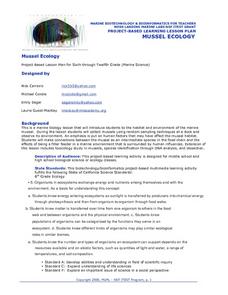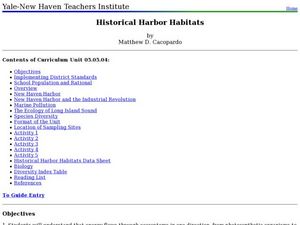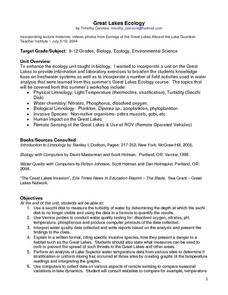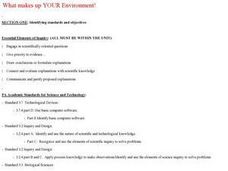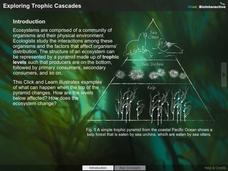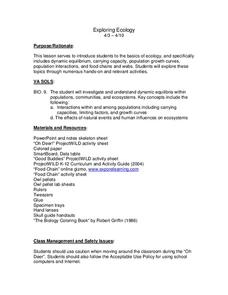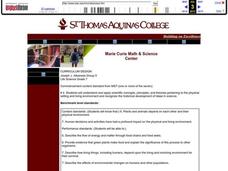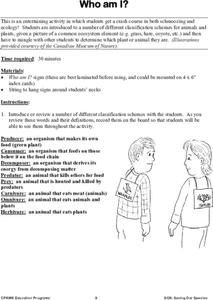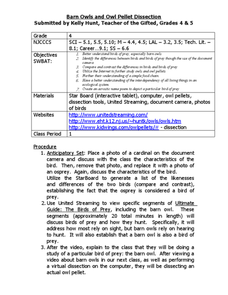Curated OER
Go To Sleep, Gecko!
Second graders examine the interdependence of organisms using the book "Go To Sleep, Gecko!" They examine a variety of food chains, listen to the book, and answer story comprehension questions. Students then conduct research on food...
Curated OER
Ecological Communities:The Prairie
Students study the meaning of ecological community and recognize its complexity. In this ecology instructional activity students diagram a food web.
Curated OER
Jeopardy 8th Grade (Science)
There are so many topics touched upon in this Jeopardy-style science game, that it is difficult to classify! The categories include electricity, matter, ecology, earth and space, and scientific investigation. This would best be used at...
Curated OER
The Web Of Life - Overlapping Food Chains
Students perform an activity in which they discover what happens when food chains overlap in an ecosystem and discover the three components of a food web.
Curated OER
Mussel Ecology
Students are introduced to the marine environment of the mussel. The emphasis of the lesson is upon what human factors are present to influence the environment in positive and negative ways. They brainstorm in groups in order to conduct...
Curated OER
Historical Harbor Habitats
Tenth graders create food web displays in the classroom. In this ecology lesson, 10th graders identify the different pollutants in the environment and their effect on organisms. They collect samples of sediments from the harbor and...
Kentucky School for the Deaf
Levels of Organization within an Ecosystem
From tiny organisms to entire biomes, young scientists examine the interdependent relationships tying all living and non-living things together with this collection of ecology resources.
Desert Museum
Daisy Ecology
Here's a fine lesson that combines poetry with life sciences. Learners carefully listen to a poem that's all about a food chain. As the poem is read, learners name the producer, the herbivore, the carnivore, and the omnivore. Lots of...
Curated OER
Great Lakes Ecology
Eighth graders identify the Great Lakes, and describe the habitat of life of a loon. They are able to point to and explain one of the major river systems that enters the Great Lakes with a focus on the Clinton River and the food webs...
Curated OER
What makes up YOUR Environment!
Students create their own land or water environment. They make their environment livable for all the different animals they collect to put in it. Students research the types of animals that they can have in their environment, and how...
Curated OER
Vocabulary: Kansas Prairies
Students explore the ecosystem by reviewing scientific vocabulary terms. For this environmental awareness lesson, students identify the differences between abiotic and biotic factors and their relationship to the Earth. Students define...
Curated OER
Hometown Ecology
Middle schoolers examine how ecology is at work in their own community. As a class, they identify what they already know about the world around them and discuss how they personally affect the environment. Using magazines, newspapers...
Howard Hughes Medical Institute
Exploring Trophic Cascades
What happens when the top predator on an ecosystem disappears? Scholars explore this idea through an introduction example and four case studies. They learn to analyze the importance of every member in a food pyramid to come to their...
Curated OER
Exploring Ecology
Students explore the basics of ecology through numerous hands-on and relevant activities. They participate in an online food chain demonstration, which explores food web dynamics. They dissect owl pellets, examine the prey's bones, and...
Curated OER
Plants and Animals
Seventh graders discover the interconnectedness of plants and animals in ecosystems. In groups, they create a food web and discuss the problems when one link of the chain is broken. To end the lesson, they set up a balanced environment...
Global Change
Impact of a Changing Climate on the Pacific Walrus
How many of us can say they've seen a Pacific walrus? Not many and one of the reasons is the impact of climate change on their aquatic environment. Children get to think about the food web of the Bering Sea by creating an actual web with...
University of Southern California
How do Organisms Interact?
Examine how organisms interact through a hands-on experience. Learners study population dynamics and distribution during an informative five-lesson unit. The focus is on the ocean environment and the organisms within it.
Curated OER
Ecological Relationships
Students identify ecological elements and their factors on species, populations and food webs. They analyze ecosystems for these elements and research how these factors influence species survival rate. Predictions on conditions over time...
Curated OER
Who Am I?
Students classify organisms into one of five categories: producer, consumer, decomposer, predator, or prey. Students play a "Who Am I" game. Signs are hung on the backs of fellow students They must ask questions to determine what...
Curated OER
Barn Owls and Owl Pellet Dissection
Students explore birds of prey and food chains. In this ecosystems and birds of prey cross curriculum science and literacy activity, students brainstorm characteristics of birds after viewing photographs. Students view a video and...
Curated OER
Introduction to Ocean Grazers
Students explore biology by creating a poster with classmates. In this oceanography lesson, students identify the importance of coral reefs to the ocean's ecology and examine a food web of ocean animals. Students define a list of...
Curated OER
Learning About the Food Chain
Learning about the food chain opens a Pandora's Box of opportunities to learn about endangered animals and the environment.
Curated OER
Invasive Mussels
In this ecology worksheet, students study a fact sheet on invasive mussels. They answer 8 short answer questions about it after reading the provided information.
Curated OER
Species Diversity in Ecosystems with Different Techniques of Land Management
Young scholars visit numerous places to help in their understanding of Ecology. In this biology lesson plan, students will learn about characteristics and how to identify numerous plants and animals. This lesson allows for many field...
Other popular searches
- Ecology Food Webs Chains
- Ecology Food Webs Reading
- Marine Ecology Food Webs
- Ecology Food Webs Exercise
- Ecology Food Webs Ocean
- Ecology Food Webs Exrcise






